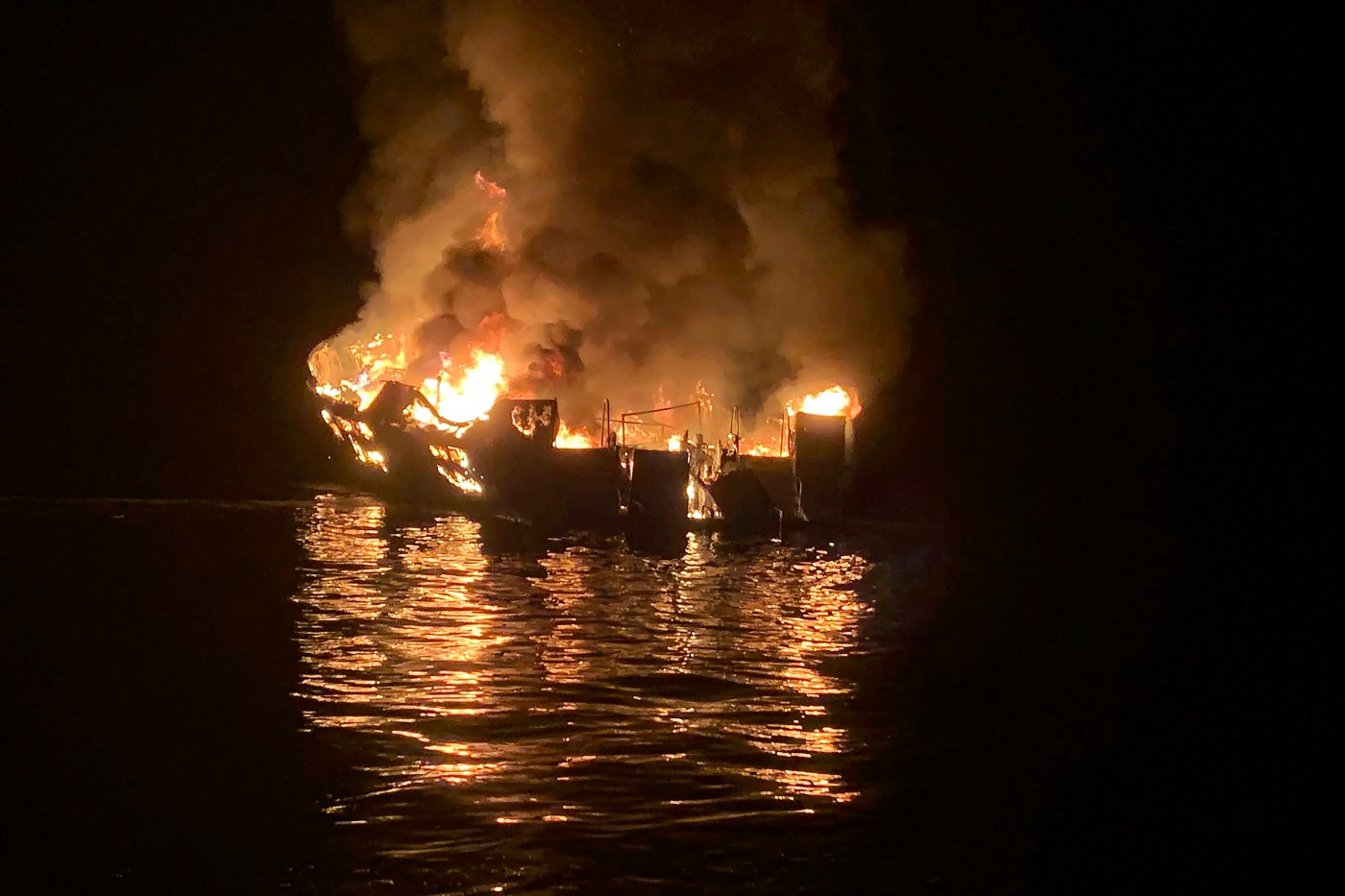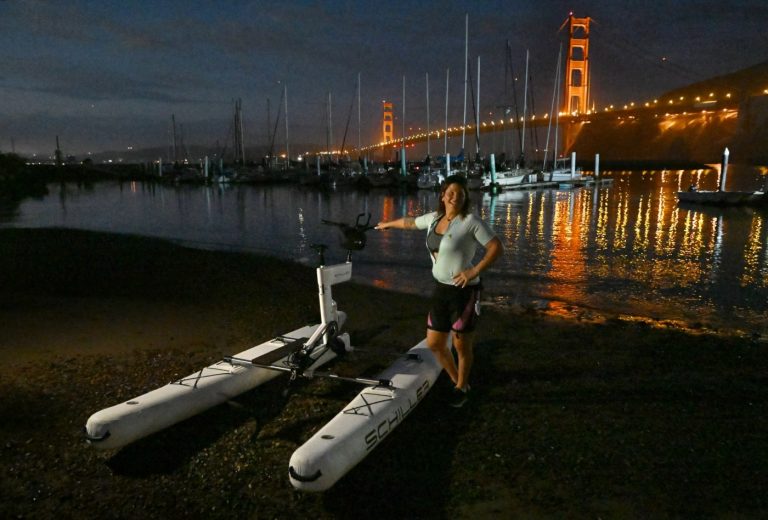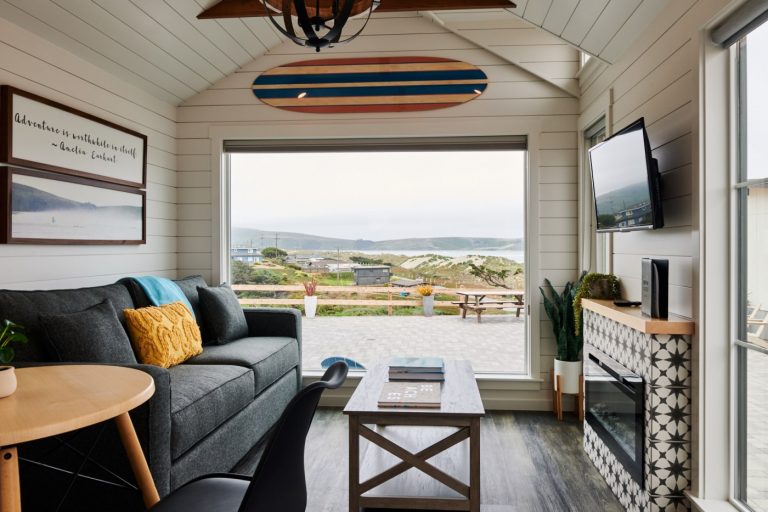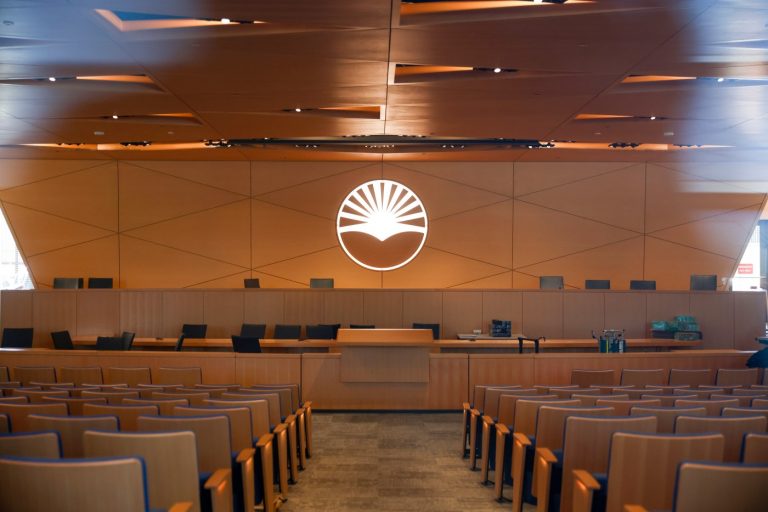In the early hours of Sept. 2, 2019, the Conception dive boat was anchored off Santa Cruz Island, 25 miles out to sea from Santa Barbara, when a fire sparked and burned unnoticed. At about 3 a.m., the passengers aboard were awakened to smoke pouring into the bunkroom and a raging fire that trapped them below.
Thirty-four people died in the Conception blaze, the deadliest California maritime disaster in more than 150 years. My husband and daughter were two of them. All these deaths were preventable as the inferno was the direct result of flagrantly lax safety measures. The fatalities were not an accident. The fire was a tragedy waiting to happen.
In this Sept. 6, 2019, photo, people visit a growing memorial to the victims who died aboard the dive boat Conception as its sister boat Vision sits in the background, in Santa Barbara. (AP Photo/Mark J. Terrill,File)
To say that many lives were shattered would be a gross understatement. Each one of those 34 had mothers, fathers, children, siblings and close friends who were devastated beyond what one can imagine. I lost half my family — my life partner of 35 years and my 26-year-old daughter who had so much to give to the world as a wildlife biologist and budding marine ecologist. When you add the 32 others who were dedicated in myriad ways to making the world better, and the lives they touched, including their families, friends and community, the impact of this tragedy is so great as to be overwhelming.
In the four-plus years since the fire, advocates and lawmakers have made significant improvements to safety and implemented new liability requirements. However, an important measure — the adoption of a clear, documented system that ensures vessels are operating safely — has yet to be required by the Coast Guard, despite more than a decade of strong recommendations from the National Transportation Safety Board.
On Nov. 6, 2023, a jury found former Capt. Jerry Nehl Boylan guilty of the federal felony offense of misconduct or neglect of a ship officer (the “seaman’s manslaughter” statute dating back to 1864). The trial showed that if Boylan had assigned a roving patrol or night watch or properly trained his crew to fight fires, those 34 people would be alive today. The fire would have been caught in time to be extinguished with the firefighting equipment on board.
Instead, the passengers below deck were the only ones using a fire extinguisher that night, but to no avail. The captain jumped ship first, three minutes before the salvaged passenger video showed the passengers still alive below in the bunkroom.
As predicted, the captain appealed the conviction. So the legal process is not over and we, the families and friends of our beloved 34, must wait even longer until, maybe, justice is finally served.
A photo collage of the 34 victims of the Sept. 2, 2019, fire aboard the dive boat Conception at Santa Cruz Island is held by a family member. The fire is the deadliest maritime disaster in recent U.S. history. (AP Photo/Damian Dovarganes,File)
New rules not enough
As family members of the 34 victims, we started Advocacy34 to ensure that tragedies such as the Conception disaster never happen to other passengers and crew of small passenger vessels. With Rep. Salud Carbajal, D-Santa Barbara, and the late U.S. Sen. Dianne Feinstein, we worked to strengthen all-too-lax U.S. Coast Guard safety management requirements through federal legislation. The Elijah Commings Coast Guard Authorization Act of 2020 mandates that the Coast Guard carry out the NTSB’s 21 recommendations from its Conception investigation. Some of the recommendations had been previously made by the agency long before the dive-boat fire.
‘The adoption of a clear, documented system that ensures vessels are operating safely — has yet to be required by the Coast Guard, despite more than a decade of strong recommendations from the National Transportation Safety Board.’
In March 2022, the Coast Guard issued new rules to address many of the NTSB recommendations. These rules require increased fire detection and suppression systems, improved means of escape, safer handling and storage of flammable items (including lithium batteries), additional crew training and technology to monitor night watches.
But these rules did not include mandating a safety management system with clear procedures, checklists and corrective measures to ensure that vessel crews are complying with regulations, company requirements and best practices. Now, three years later, small passenger marine vessels still have not formally adopted such a safety management system.
We’ve also seen success in the passage of The Small Passenger Vessel Liability Fairness Act, authored by Carbajal and co-sponsored by Feinstein. That act changed the antiquated 1851 Limitation of Liability statute for small passenger boats that limited payments to passengers to the value of the boat wreckage. President Biden signed the bill in December 2021, and it took effect the following March.
The burned hull of the dive boat Conception is brought to the surface by a salvage team off Santa Cruz Island, Calif., Sept. 12, 2019. (Brian van der Brug/Los Angeles Times via AP, File)
The value of a life
Before the act passed, the Conception’s owner, Glen Fritzler of Truth Aquatics, had hid behind the protections of the 19th-century law. To do so, he had to file legal notices addressed to those who had died in the dive boat fire. The legal strategy allowed him to limit liability to the value of the vessel, post-wreck, which was basically $0.
Imagine how it felt to receive such a legal notice a few days after learning your loved ones died. I received two such claims, addressed to my daughter and husband, that explicitly stated their lives had no value because the ship they were on had no value.
Under the Liability Fairness Act, the ship owners will be held financially responsible for all lives lost aboard their vessels. It no longer matters what the vessel is worth. Sadly, however, this act does not apply retroactively.
Our work as Advocacy34 to ensure that similar devastation doesn’t occur again won’t bring back our loved ones. However, it has helped us navigate the pain from losing them in a preventable tragedy. No longer should anyone board a vessel wondering if the legal safety requirements are being met.
We don’t want anyone to have to go through what we’ve been through. Tragedies that occur due to safety negligence are not accidents. They are often predictable and preventable, and we all have a role to play to prevent such terrible losses.
Vicki Moore is a Los Altos resident. Her career has been devoted to land conservation, as former policy director of Greenbelt Alliance, and environmental literacy, as founder of Living Classroom.













+ There are no comments
Add yours